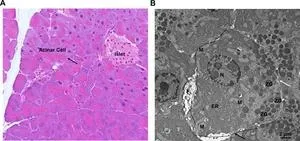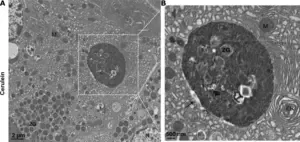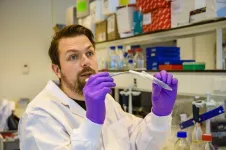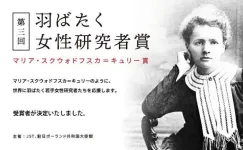(Press-News.org) Researchers at Rensselaer Polytechnic Institute have fabricated a device no wider than a human hair that will help physicists investigate the fundamental nature of matter and light. Their findings, published in the journal Nature Nanotechnology, could also support the development of more efficient lasers, which are used in fields ranging from medicine to manufacturing.
The device is made of a special kind of material called a photonic topological insulator. A photonic topological insulator can guide photons, the wave-like particles that make up light, to interfaces specifically designed within the material while also preventing these particles from scattering through the material itself.
Because of this property, topological insulators can make many photons coherently act like one photon. The devices can also be used as topological “quantum simulators,” miniature laboratories where researchers can study quantum phenomenon, the physical laws that govern matter at very small scales.
“The photonic topological insulator we created is unique. It works at room temperature. This is a major advance. Previously, one could only investigate this regime using big, expensive equipment that super cools matter in a vacuum. Many research labs do not have access to this kind of equipment, so our device could allow more people to pursue this kind of basic physics research in the lab,” said Wei Bao, assistant professor in the Department of Materials Science and Engineering at RPI and senior author of the Nature Nanotechnology study.
“It is also a promising step forward in the development of lasers that require less energy to operate, as our room-temperature device threshold — the amount of energy needed to make it work — is seven times lower than previously developed low-temperature devices,” Bao added.
The RPI researchers created their novel device with the same technology used in the semiconductor industry to make microchips, which involves layering different kinds of materials, atom by atom, molecule by molecule, to create a desired structure with specific properties.
To create their device, the researchers grew ultrathin plates of halide perovskite, a crystal made of cesium, lead, and chlorine, and etched a polymer on top of it with a pattern. They sandwiched these crystal plates and polymer between sheets of various oxide materials, eventually forming an object about 2 microns thick and 100 microns in length and width (the average human hair is 100 microns wide).
When the researchers shined a laser light on the device, a glowing triangular pattern appeared at the interfaces designed in the material. This pattern, dictated by the device’s design, is the result of topological characteristic of lasers.
“Being able to study quantum phenomena at room temperature is an exciting prospect. Professor Bao’s innovative work shows how materials engineering can help us answer some of science’s biggest questions,” said Shekhar Garde, dean of the RPI School of Engineering.
The study was primarily supported by grants from the National Science Foundation and Office of Naval Research.
END
How a tiny device could lead to big physics discoveries and better lasers
Rensselaer Polytechnic Institute researchers have created the first topological quantum simulator device in the strong light-matter interaction regime that operates at room temperature
2024-05-24
ELSE PRESS RELEASES FROM THIS DATE:
Ambitious targets are needed to end ocean plastic pollution by 2100
2024-05-24
The study, a collaboration between researchers at Imperial College London and GNS Science, suggests that reducing plastic pollution by 5% per year would stabilize the level of microplastics – plastics less than 5 mm in length – in the surface oceans.
However, the modelling shows that even reducing pollution by 20% per year would not significantly reduce existing microplastics levels, meaning they will persist in our oceans beyond 2100.
Microplastics have been found to be circulating in all of the Earth’s oceans and some of the greatest concentrations of them are thousands of miles from land. These tiny particles ...
Boost for research aiming to cure chronic diseases in an aging population
2024-05-24
The DRIVE-RM consortium, led by Professor of Experimental Nephrology Marianne Verhaar from UMC Utrecht, has been awarded €37.5 million under the prestigious NWO SUMMIT program. The SUMMIT grant recognizes world-class collaborations, while further strengthening these partnerships. The DRIVE-RM collaboration involves UMC Utrecht, Utrecht University, Eindhoven University of Technology, Maastricht University, and the Hubrecht Institute, focusing on smart materials that assist the body in healing.
Regenerative medicine involves repairing or replacing damaged tissues and organs by leveraging the body's own healing processes. DRIVE-RM ...
Quadruple therapies and the future of multiple myeloma treatment
2024-05-24
MIAMI, FLORIDA (MAY 23, 2024) – The treatment landscape for multiple myeloma, the second most common blood cancer, is shifting rapidly, with newly diagnosed patients increasingly being treated with a four-part drug combination that includes a new immunotherapy agent.
Over the last decade, options have evolved from double, to triple to quadruple combination therapies. What do these new options mean for patients, and how will treatment change in the future?
C. Ola Landgren, M.D., Ph.D., will ...
Announcement of winners for the third “Marie Sklodowska Curie Award”
2024-05-24
JST has selected winners for the third Marie Sklodowska Curie Award for young female researchers. For the third Marie Sklodowska Curie Award, we accepted applications from October 2 to December 11, 2023. Through document screenings and interviews with external experts, we have selected one Grand Prize winner and two Inspiration Prize winners. JEOL Ltd. will award 1M yen for the Grand Prize and 500K yen for each Inspiration Prize.
JST recognizes the importance of initiatives designed to promote the activities of female researchers in science, technology, and innovation, and based on this belief we established the “Marie ...
Baby bonuses and wedding bells: how life's big moments can challenge startups
2024-05-24
Life-changing events like the birth of a child, the purchase of a new home, or a lottery win could threaten the survival of a new business venture, research from Edith Cowan University (ECU) has found.
A recent study led by ECU’s Professor of Entrepreneurship and Innovation Pi-Shen Seet with Associate Professor Wee-Liang Tan from the Singapore Management University found that positive family events had a comparatively greater influence, albeit negatively, on the survival of a new venture, compared with negative events.
“A positive family event, like the birth of a child, often has an emotional spin-on effect for an entrepreneur ...
Wagner named 2024 recipient of the ASME George Westinghouse Gold Medal
2024-05-24
Robert Wagner, associate laboratory director for the Energy Science and Technology Directorate at the Department of Energy’s Oak Ridge National Laboratory, has been selected to receive the George Westinghouse Gold Medal from the American Society of Mechanical Engineers, or ASME. The award recognizes his work to advance state-of-the-art clean power generation systems through research on combustion, fuel technologies and controls.
Wagner will be presented the award in October during ASME’s ...
Sylvester research shows new treatment may enable more patients with high-risk blood cancers to receive stem cell transplants
2024-05-24
MIAMI, FLORIDA (MAY 23, 2024) – A new treatment approach using an older drug may enable more patients with high-risk blood cancers to receive transplanted stem cells from unrelated, partially matched donors, according to a study conducted by researchers at Sylvester Comprehensive Cancer Center at the University of Miami Miller School of Medicine and colleagues.
Results to be presented at the annual meetings of the American Society of Clinical Oncology (ASCO) and the European Hematology Association suggest the new approach may expand the donor pool, with patients from underrepresented racial and ethnic ...
Internationally trained female oncologists face many discrimination challenges in the U.S.
2024-05-24
MIAMI, FLORIDA (May 23, 2024) – Coral Olazagasti expected a relatively smooth transition when she moved to New York to start her residency after graduating from medical school in her native Puerto Rico. But that proved wishful thinking.
She not only experienced major culture shock, but also her superiors and colleagues often chastised her for speaking too loudly and joked about her accent.
“Puerto Rico is a U.S. territory so when I moved to New York, I thought it wasn’t going to be a big change,” said Olazagasti, ...
Fred Hutch at ASCO: Progress in treating metastatic cancer, hospice access for cancer patients, use of machine learning with CAR T-cell therapy
2024-05-24
The 2024 annual meeting of the American Society of Clinical Oncology (ASCO) will take place in Chicago and online May 31-June 4.
Below are highlights of Fred Hutch Cancer Center research to be presented at the conference and experts available to comment on news. You can follow Fred Hutch on social media for additional updates and check out Fred Hutch booth #14018 in the exhibit hall.
For interview requests with Fred Hutch experts, please contact media@fredhutch.org.
Prostate cancer
Prostate cancer is the most common cancer among men in the United States and, according to the National Cancer Institute, ...
How neurons build a 3-D vascular structure to keep the retina healthy
2024-05-24
Scientists have known for years that a lattice of blood vessels nourishes cells in the retina that allow us to see – but it’s been a mystery how the intricate structure is created.
Now, researchers at UC San Francisco have found a new type of neuron that guides its formation.
The discovery, described in the May 23, 2024, issue of Cell, could one day lead to new therapies for diseases that are related to impaired blood flow in the eyes and brain.
“This is the first time anyone has seen retinal neurons using direct contact with blood vessels as a way of guiding them to form these precise 3-D lattices,” said ...
LAST 30 PRESS RELEASES:
Cannabis compounds show promise in fighting fatty liver disease
Study in mice reveals the brain circuits behind why we help others
Online forum to explore how organic carbon amendments can improve soil health while storing carbon
Turning agricultural plastic waste into valuable chemicals with biochar catalysts
Hidden viral networks in soil microplastics may shape the future of sustainable agriculture
Americans don’t just fear driverless cars will crash — they fear mass job losses
Mayo Clinic researchers find combination therapy reduces effects of ‘zombie cells’ in diabetic kidney disease
Preventing breast cancer resistance to CDK4/6 inhibitors using genomic findings
Carbon nanotube fiber ‘textile’ heaters could help industry electrify high-temperature gas heating
Improving your biological age gap is associated with better brain health
Learning makes brain cells work together, not apart
Engineers improve infrared devices using century-old materials
Physicists mathematically create the first ‘ideal glass’
Microbe exposure may not protect against developing allergic disease
Forest damage in Europe to rise by around 20% by 2100 even if warming is limited to 2°C
Rapid population growth helped koala’s recovery from severe genetic bottleneck
CAR-expressing astrocytes target and clear amyloid-β in mouse model of Alzheimer’s disease
Unique Rubisco subunit boosts carbon assimilation in land plants
Climate change will drive increasing forest disturbances across Europe throughout the next century
Enhanced brain cells clear away dementia-related proteins
This odd little plant could help turbocharge crop yields
Flipped chromosomal segments drive natural selection
Whole-genome study of koalas transforms how we understand genetic risk in endangered species
Worcester Polytechnic Institute identifies new tool for predicting Alzheimer’s disease
HSS studies highlight advantages of osseointegration for people with an amputation
Buck Institute launches Healthspan Horizons to turn long-term health data into Actionable healthspan insights
University of Ottawa Heart Institute, the University of Ottawa and McGill University launch ARCHIMEDES to advance health research in Canada
The world’s largest brain research prize awarded for groundbreaking discoveries on how we sense touch and pain
Magnetofluids help to overcome challenges in left atrial appendage occlusion
Brain-clearing cells offer clues to slowing Alzheimer’s disease progression
[Press-News.org] How a tiny device could lead to big physics discoveries and better lasersRensselaer Polytechnic Institute researchers have created the first topological quantum simulator device in the strong light-matter interaction regime that operates at room temperature







